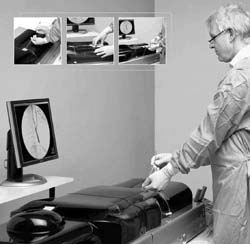Training on the heart
Cardiologists learning to perform endovascular surgery
Every year over one million Ukrainians suffer heart attacks, strokes, and other diseases of the cardiovascular system. In Kyiv alone between 2,000 and 3,000 heart attacks are recorded each year. Medical personnel say this figure is on the rise.
Today doctors offer a wide range of treatments — from drugs to surgery. However, drugs do not always provide a cure and operations can lead to complications. Fortunately, medical science is constantly evolving, and today a heart patient can be saved with a minimum of surgical intervention-thanks to endovascular surgery.
“Endovascular surgery is now available in Ukraine,” says Dr. Yurii Sokolov, the head of the Department of Interventional Cardiology at the Strazhesko Institute of Cardiology. “Our institute has opened a training center for cardiologists. Each trainee can learn to perform top-notch endovascular operations. During this type of operation special devices are inserted into a blood vessel to fix the damage from the inside. Our doctors are acquiring new knowledge and practical experience using a simulator supplied by the Cordis Company. Without its assistance, Ukraine would have had to wait a long time to get this high- precision electromechanical cardiological system, which is worth half a million dollars.”
Dr. Sokolov explained that the simulator is intended for various kinds of operations on the heart and blood vessels (angiography, stenting, transseptal puncture of the antrioverticular septum). The machine consists of a computer with two monitors and a dummy. The simulator works according to the chain principle. When the cardiologist performs certain manipulations on a patient’s heart or blood vessels, the simulator turns them into electronic signals. Special computer software receives these signals as input and produces 3-D images. The screen shows realistic images that imitate the technique of fluoroscopy (for obtaining “live” X-ray images from a living patient) during surgery. During training the dummy supplied with the simulator is used as a patient, thus obviating the need for live patients.
According to Dr. Sokolov, training on simulators, which were introduced into medical practice only two years ago, is new to both Ukrainian doctors and their colleagues abroad. However, unlike other countries, Ukraine does not have specialists in this field of medicine. Sokolov explains that the reason for this is the small number of educational centers that provide training in endovascular surgery — there are only 17 in our country. Only 50 cardiologists are able to perform this type of operation, too small a number to cope with the millions of people with heart problems.
Sokolov is convinced that the new simulator will expedite the training of surgeons. Many doctors, however, have preconceived notions about the device, and it will be difficult to make them believe the contrary, says the head of the Department of Interventional Cardiology. But all mistaken ideas and traditions need to be put aside because here it is not a question of deciding what drug to use or what day to schedule an operation. People’s lives are at stake and this should be the first priority.






